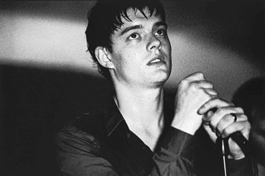home | metro santa cruz index | movies | current reviews | film review

Sensitive Boy: Scott Riley is angst-ridden Joy Division frontman Ian Curtis in Anton Corbijn's 'Control.'
Review: Control
Joy Division's fragile lead singer, Ian Curtis, is immortalized in Anton Corbijn's biopic.
By Richard von Busack
It takes place in the past, certainly in a different country. When watching Control, the young musician of today will marvel that a rock star could hurt so much over a little matter like adultery.
Director Anton Corbijn chronicles the thunderous arrival of punk rock in one of the stillest corners of England. In a nightclub, here are a group of young men from Macclesfield bathing in the pulsating glow of light and the roar of the Sex Pistols amps. We don't see the Pistols, though; it's like a ray from an alien ship. Ian Curtis and his friends decide to start a band.
They call themselves Joy Division. They play their first gig under that name in January 1978 and pressure the sarcastic local TV host Tony Wilson (Craig Parkinson) to air their 45 rpm record on his show.
Joy Division is an unlikely success, the kind that can't be hyped into being. They have the instinct for protest, having named themselves after a war atrocity. Their greatest hit is "Love Will Tear Us Apart," an answer record to a chirpy Captain & Tennille song. Yet the band answers punk's call with romanticism—with love songs, of a sort.
Curtis is afflicted with worsening grand-mal seizures; the medicine has a legion of bad side effects. On the road, he falls in love with a dark-eyed Belgian embassy worker named Annik (Alexandre Maria Lara), despite his wife and child at home.
In Control, the members of the band are characters in silhouette; they seem slightly baffled by the person they chose to be their voice.
Curtis's sighing, iced romanticism contradicts the metallic sound of the band's rhythm section. It hisses, it whispers, it emits lead-pipe thumps; it's the sound of ghost laborers in a derelict factory. On paper the first two lines of Joy Division's song "Disorder" trip along like Noel Coward lyrics: "This is the crisis I knew had to come/ Destroying the balance I kept ..."
Like a few other rock musicians, Curtis failed to anticipate how sordid the life he chose could be. Corbijn, who knows all about it, is acid and shrewd about the breezy treachery and arrogance of the managers, the cold trips home at 3am and the expendability of a performer. Toward the end, when Curtis collapses, a hapless roadie is hired to sing in his place for an insignificant sum of money. Control becomes sort of inevitable toward the end. That's the plague on all musical biopics about singers who cannot stay alive. But the director conjures up great iconry. The black-and-white "landscapes and figures" are exactly like what one dreamed of in solitary listening to Joy Division's Unknown Pleasures and Closer.
The local press has been identifying Macclesfield as a Manchester suburb, much as an English person might look at a map of California and deduce that Stockton was a suburb of San Francisco. The actual place is smaller, sadder. One shot, when Curtis—in his foolishly passive way—lowers the boom on his wife, Debbie (Samantha Morton), they're framed by a misshapen closed factory parked at the base of dark hills. The streets here have Bible-black sadness, the sense of a Sunday that lasts seven days a week. The only smoking chimney we see is in the last shot.
Corbijn frames the drama from widow Debbie Curtis' memoirs. Debbie wanted to stay in the shelter of this small town; Ian wanted to be free of its grip. We get her side of it. Morton's Debbie is more than a strong enough actress to make her points about the quieter, stabler life. Corbijn draws our attention to a parked baby carriage on the street in front of the Curtis' flat. No one in her town would be mean enough to steal it; it's a different place than in the city. Even the boss who suggests Curtis should quit his day job is nice about the matter.
In the lead, Sam Riley doesn't pollute the memories of Curtis, though his voice isn't as resonant, or as astoundingly like Jim Morrison's as Curtis's voice was. He's physically right, awkward and yet fascinating. He conjures the spirit of the inward-looking musician, the frailness and the jitteriness. Control's highlight is Riley's version of "Transmission." You see the original on YouTube and it's well recreated, with Riley wired up and trembling like a leaf before the microphone stand. The song does what Joy Division did best. Curtis protested against the sugared, numb AM radio dream of love, as only a true lover would.
![]() CONTROL (R; 129 min.), directed by Anton Corbijn, written by Deborah Curtis and Matt Greenhalgh, photographed by Martin Ruhe and starring Sam Riley and Samantha Morton, opens Friday at the Nickelodeon in Santa Cruz.
CONTROL (R; 129 min.), directed by Anton Corbijn, written by Deborah Curtis and Matt Greenhalgh, photographed by Martin Ruhe and starring Sam Riley and Samantha Morton, opens Friday at the Nickelodeon in Santa Cruz.
Send a letter to the editor about this story.
|
|
|
|
|
|